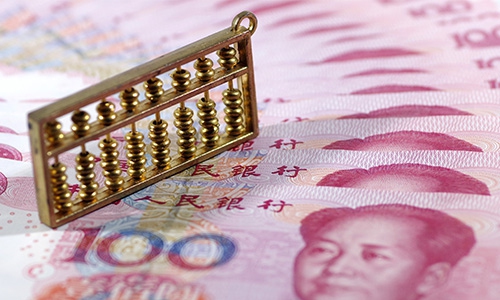Strong fundamentals support investors’ faith in China: economist
 Renminbi Photo: VCG
Renminbi Photo: VCGAs global major currencies, notably the euro, have weakened sharply against the US dollar amid worsening global financial turbulence, the Chinese yuan has remained remarkably stable and Chinese assets have become increasingly attractive to global investors, underscoring China’s solid economic fundamentals, economists said on Thursday.
The central parity rate of the Chinese yuan strengthened 17 basis points to 6.7265 against the US dollar on Thursday, with its fluctuation range further narrowing since mid-May, according to data from the China Foreign Exchange Trade System.
The yuan’s stabilizing trend comes as the US Dollar Index (DXY) keeps hitting nearly two-decade highs. As of press time on Thursday, the reading peaked at 109.29 in intraday trading, surging over 13 percent year-to-date.
Corresponding to the sharp appreciation of the US dollar this year, major currencies, including the euro, the British pound and the Japanese yen, have seen their values slump by 11-16 percent. The euro even plunged below parity against the dollar on Wednesday, the first time in 20 years, according to media reports.
By comparison, the yuan has shown strong resilience amid the turbulent forex market, depreciating only about 5.4 percent against the dollar year-to-date. Starting from mid-April, the yuan’s rate against the dollar weakened sharply from 6.3896 to 6.7871 on May 16. Since then, the reading has been generally fluctuating around 6.7, with a narrowing range.
The pressure on the yuan has effectively been relieved after a round of depreciation, Guan Tao, BOC International’s global chief economist and a former official at the State Administration of Foreign Exchange, told the Global Times on Thursday.
With the Omicron flare-ups in China being generally put under control since May, government policies to stabilize growth have been rolled out and started to take effect, Guan said, noting that both economic and financial indicators have improved.
“In particular, the rapid recovery of the country’s exports in May and June, with an expanding trade surplus, has formed fundamental support for the stabilization of the yuan,” Guan said.
The yuan’s exchange rate mechanism, which anchors it to a basket of currencies, helps to keep it fluctuating in a relatively stable range, Zhou Yu, a research fellow at the Shanghai Academy of Social Sciences, told the Global Times.
Amid skyrocketing inflation in the US, market observers believe that the dollar will remain strong for the rest of the year and keep piling pressure on other currencies. The US CPI surged to a 41-year high at 9.1 percent in June, latest official data showed on Wednesday.
Though the US is mired in economic woes, Europe has even worse economic fundamentals, with surging stagflation risks, analysts said, noting that the Ukraine crisis stoked by the US-led NATO has brought about a serious energy shortage for many European countries and badly dampened their economic prospects.
The eurozone’s main economies, including Germany and France, have seen deteriorating developments. Germany posted a trade deficit in May, the first time in more than 30 years.
While other major economies struggle with soaring inflation, which has led to tightening monetary policies and recession risks, China’s inflation has remained at a mild level, and its fiscal and monetary policies are in normal conditions, Guan said, noting that it has left China ample space to cope with risks from both home and overseas. “That is the reason why investors have confidence in yuan-denominated assets,” Guan said.
Stocks in the Chinese mainland have outperformed many major overseas markets recently. Foreign capital flowing into mainland markets through Hong Kong, otherwise known as “northbound capital,” totaled 73 billion yuan ($10.8 billion) in June, according to statistics from Founder Securities.
Some countries have started to raise the share of the yuan in their foreign currency reserves as well. Belarus was the latest, announcing a plan to include the yuan in its reserves on Wednesday.
Zhou noted that besides the yuan’s value, Washington’s constantly using the dollar as a weapon to sanction others is another factor driving countries to consider diversifying their reserves.
“Essentially, it is China’s strong fundamentals that support investors’ faith in the yuan,” Guan concluded.

Leave A Comment